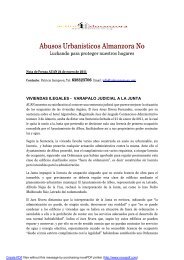European Property Rights and Wrongs - Diana Wallis MEP
European Property Rights and Wrongs - Diana Wallis MEP
European Property Rights and Wrongs - Diana Wallis MEP
You also want an ePaper? Increase the reach of your titles
YUMPU automatically turns print PDFs into web optimized ePapers that Google loves.
<strong>Property</strong> law reflects society <strong>and</strong> this varies widely across the continent, as does<br />
the nature of the l<strong>and</strong> being regulated. Public opinion would not support a massive<br />
transfer of powers over property to Brussels. The treaties establishing the EU<br />
recognise the competence of each state to organise its own system of property.<br />
Subsidiarity requires that decisions should be made at a national level. Although<br />
some people support a common civil code <strong>and</strong> there is even a draft circulating<br />
(the Draft Common Frame of Reference) this development seems to be a political<br />
impossibility. There would be outrage were Brussels to impose, for example, a<br />
single planning system across the continent.<br />
The flip side of this is seen when an EU citizen purchases a property in another<br />
State. The EU lacks the competence to deal with defects in domestic property law.<br />
Timeshare provides an ideal illustration. The very word makes the majority of the<br />
UK population shudder, the result of the aggressive marketing techniques once<br />
used. This was before EU legislation swept the Continent clear of malpractice.<br />
Europe has scored a major success in regulating aspects of marketing such as<br />
information <strong>and</strong> withdrawal, in banning unfair practices, <strong>and</strong> (under a new version<br />
of the Directive) resale <strong>and</strong> exchange. Around three quarters of complaints<br />
received by the Commission fall within the <strong>European</strong> ambit. This leaves one quarter<br />
to national laws, issues arising from the substantive law such as the ownership<br />
structure of timeshare blocks, management <strong>and</strong> problems with new build blocks.<br />
Excessive service charges are the new battleground.<br />
This explains why victims of the ‘l<strong>and</strong> grab’ laws in Valencia have not found<br />
redress through the EU <strong>and</strong> why <strong>MEP</strong>s have been frustrated in their efforts to<br />
help. If a rural property is urbanised <strong>and</strong> as a result infrastructure costs are imposed<br />
on the owner of a property, that action is controlled primarily by the law<br />
of the Spanish region where the property is sited, a law which operates within<br />
the regional <strong>and</strong> Spanish constitutions. If a property has been built illegally in a<br />
protected coastal zone, a decision to order its demolition is regulated in the same<br />
way. In both cases the Spanish authorities may be constrained by the principles of<br />
the <strong>European</strong> Convention on Human <strong>Rights</strong>, which guarantees the right to property,<br />
though as explained elsewhere this will only assist in quite exceptional cases.<br />
The law of the <strong>European</strong> Union draws a blank because states are allowed to organise<br />
their own systems of property law. (Where the EU does have competence,<br />
it must respect the right to property in the same way that states must do so.)<br />
30<br />
A <strong>European</strong> L<strong>and</strong> Law?



